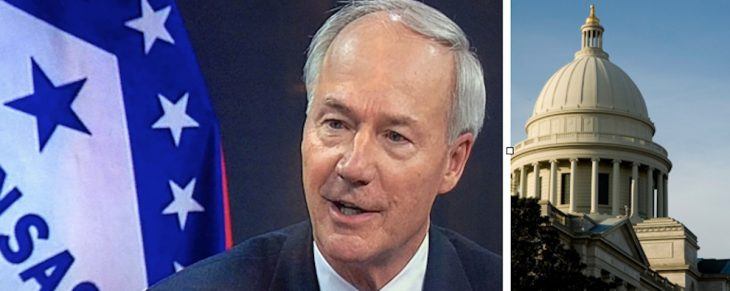Gov. Hutchinson pleased with election, but casino budget hole looms
by November 7, 2018 9:10 pm 2,045 views

Gov. Asa Hutchinson said Wednesday (Nov. 7) “a smile came to my face” when asked about the previous day’s elections. However, he is not as happy that the passage of an amendment legalizing four Arkansas casinos will create more than a $40 million hole in next year’s budget.
Hutchinson spoke in a press conference at the Capitol the day after defeating Democrat Jared Henderson, 65-32%. Libertarian Mark West won 2.91% of the vote.
Hutchinson noted that he had carried all but seven counties and singled out Mississippi County, where he said he won more than 60% of the vote. He said more votes were cast for him than any other gubernatorial candidate in the last 30 years.
Four incumbents lost in House races, including Republican Reps. Charlie Collins, R-Ark., who was defeated by Denise Garner, and Jeff Williams, R-Springdale, who lost to Megan Godfrey by 30 votes.
Hutchinson said Collins had been a strong ally regarding tax policy and “was a person of strong convictions that practiced civility.” Williams’ loss was a surprise, Hutchinson said.
Two Democratic House members, Reps. Scott Baltz, D-Pocahontas, and Michael John Gray, D-Augusta, also were defeated. Hutchinson noted that he had endorsed their opponents and had traveled to Baltz’s district to campaign for Marsh Davis. He said that “perhaps that made some difference.”
Gray, who lost to Craig Christiansen, is chairman of the Democratic Party of Arkansas. Hutchinson called Gray “always a joy for me to work with.”
“That goes to show how difficult that position can be in mixing that with your own legislative race,” the governor said.
Hutchinson was asked about the passage of Issue 4 legalizing casinos at Oaklawn Racing & Gaming in Hot Springs, Southland Park Gaming & Racing in West Memphis, and in Pope and Jefferson counties. Hutchinson said he had voted against the amendment. It passed with 54% of the vote.
“My first budget meeting today showed a $40-plus million gap because that amendment passed,” he said. “That reduced the tax rate [for Oaklawn and Southland], and so we have to adjust for that down the road.”
Hutchinson said he didn’t know what the amendment’s long-term effects would be.
In an Arkansas Supreme Court race, Justice Courtney Goodson was re-elected with 56% of the vote against David Sterling despite millions of dollars spent on Sterling’s behalf by undisclosed, so-called “dark” money groups.
Hutchinson noted he had previously floated the idea that Supreme Court justices should be appointed, but “that didn’t catch on.” Goodson’s win will diffuse any efforts to change the process, he said. He said spending by outside groups reduces candidates’ control of their message and reduces the amounts they can raise.
During the campaign, Hutchinson expressed his intention to ask legislators to present a highway revenue plan to voters in 2020. He said he had asked the Arkansas Department of Transportation to provide data regarding how much money is needed for maintenance and how much is needed for new construction. Once he gets a response, he’ll work with legislators to craft a plan.
The press conference was called to announce that the number of Arkansas high school students enrolled in computer science courses has reached 8,044, an increase of 30% from the 6,184 taking classes last year. Hutchinson made increasing the number a central focus of his 2014 campaign and his first term in office. When the initiative started, 1,100 students were taking the courses, and only about 20 high school teachers were identified as being qualified to teach computer science. Now, more than 300 educators are qualified.
Hutchinson said the increasing number of students taking those courses is a selling point when recruiting technology-related companies. Students who score at least a 3 on the Advanced Placement course earn concurrent college credit. If 10% of students taking the classes are entrepreneurial, 800 students would move into the economy with the ability to “create something using their coding skills.” That influx could change the state’s economy, he said.
The governor has visited more than 60 high schools touting the initiative. Among the successful schools is Hamburg in southeast Arkansas, thanks to the presence of an effective teacher.
“I go intentionally every year to to small rural schools as well as urban schools, and you have just as successful programs in rural schools when you have a good teacher because the students get excited,” he said.
